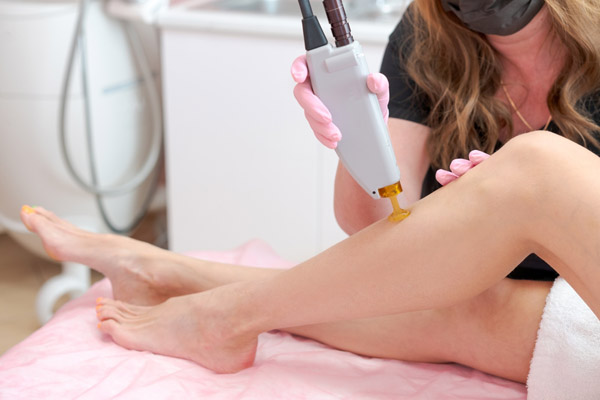How to Prepare for a Thigh Lift Surgery

A thigh lift is a cosmetic surgery that eliminates excess skin and fat deposits on the inner thigh. The surgeon can perform this procedure with general or local anesthesia depending on the specific surgical plan. In order to have a successful thigh lift procedure, one must prepare up to two weeks beforehand, considering their lifestyle. Here are some tips to help prepare yourself for thigh lift surgery.
The ultimate guide to preparing yourself for thigh lift surgery
Medical evaluation
Before a thigh lift surgery, the plastic surgeon must determine that the patient is an ideal candidate. Therefore, patients must undergo a medical evaluation and lab tests. This evaluation's goal is to check that the individual is healthy enough to undergo surgery and ensure no underlying conditions need to be addressed before surgery. The surgeon may order the following tests:
Hemoglobin Test
This is a measure of the amount of iron present in the red blood cells. Hemoglobin carries oxygen to all parts of the body. If there is too little hemoglobin in the bloodstream, it can lead to anemia.
Red Blood Cells
This measures the number of red blood cells in each cubic millimeter of blood. Red blood cells make up half of all blood cells in the body, and if dropped too low, it can cause anemia.
White Blood Cells
This measures the number of white blood cells found in each cubic millimeter of the blood and is important to help fight infections and other illnesses during healing.
Blood Pressure Measurement
Blood pressure is important for monitoring the heart's health. If too high, it can cause damage to the heart and increase the risk of a heart attack or stroke during the thigh lift operation.
CBC Differential
A CBC differential measures the types of red blood cells in the body, including their size and shape. The test helps detects conditions such as leukemia, bone marrow failure, and other types of cancer that may need to be addressed before the procedure.
CMP
A complete metabolic panel (CMP) measures several electrolytes (sodium, potassium, chloride), blood glucose, kidney and liver functions, and cholesterol levels in the blood. It also checks for signs of diabetes, such as an elevated fasting glucose level.
HIV test
The surgeon will check for HIV infection by looking for antibodies against HIV or proteins produced when the virus infects the body. However, this test does not show if a person has AIDS (acquired immunodeficiency syndrome), only if they have been exposed to HIV at some point.
Coagulation Panel
This measures the ability of platelets to stick together after being damaged by outside forces such as cuts (incisions), burns, or trauma.
Urinalysis
A urinalysis checks for protein, glucose, ketones, and white and red blood cells in a person's urine. It also checks for evidence of pregnancy, infection, or other diseases that affect the kidneys or urinary tract system.
Adjust current medications
Certain medications can negatively affect the procedure, namely blood thinners. Therefore, if a patient takes a blood thinner such as warfarin, aspirin, or clopidogrel, they must inform during their consultation. This is because they can increase bleeding during and after surgery. Suppose a patient is currently taking a specific medication. In that case, they will need clearance from their primary care physician to undergo the thigh lift surgery and, if necessary, to be prescribed medications during recovery.
Stop consuming tobacco and alcohol products
The plastic surgeon will recommend that the patient does not consume tobacco products (smoking, chewing, etc.) or alcohol up to two weeks before thigh lift surgery. Smoking, independently, directly impacts one's blood flow, leading to increased bleeding and risk of infection. Consuming alcohol can lead to dehydration. However, smoking and alcohol interfere with sugar blood sugar levels, which can cause hypoglycemia (extremely low blood sugar).
Prepare for recovery
The recovery process following a thigh lift surgery is similar to any other type of cosmetic surgery. Patients will be given instructions before their procedure on properly caring for their incisions, wounds, and dressings. The surgeon may also recommend certain over-the-counter inflammatory medications at home in addition to the painkillers they will prescribe.
Patients will also need to schedule time off with their employers for a few weeks (varies from patient to patient). In addition, the surgeon will place the patient on bed rest because they will not be permitted to perform normal activities (showering, walking, etc.) without assistance following the first few days or weeks of surgery.
Make sure you are properly prepared for surgery
We hope this article was beneficial to you. If you are considering undergoing a thigh lift, you first need to contact our office. Then, we will schedule you with our surgeon for a consultation to ensure you are an ideal candidate for this procedure.
Request an appointment here: https://www.paulcdillonmd.com or call Paul C. Dillon, MD Inc at (847) 429-3185 for an appointment in our Schaumburg office.
Check out what others are saying about our services on Yelp: Read our Yelp reviews.
Recent Posts
A breast lift reshapes and raises the bust, while breast augmentation increases volume and enhances contours. While both procedures improve the breasts ' appearance, they serve different purposes. When exploring these options, it helps to understand how each one works, when one may be more beneficial over the other, and when the plastic surgeon may…
In recent years, there have been major changes in the methods for unwanted hair removal, offering individuals several options for smooth, hair-free skin. Two of the most popular treatments, laser hair removal and waxing, are known for their effectiveness and for providing long-term results. While both methods focus on reducing hair, they differ in their…
Medical-grade facials offer a level of care and results that traditional spa treatments cannot provide. This treatment combines the science of plastic surgery and cosmetic benefits to address deeper skin concerns. Unlike general relaxation facials offered at spas, medical-grade facials are performed in medical environments with professional oversight.A primary difference between medical-grade facials and spa…
As with any surgical procedure, the recovery period of a tummy tuck is crucial to its success. The key to a successful recovery is knowing what to expect so you can prepare ahead of time. Understanding what to expect can help ensure a smooth recovery.It is important to note that recovery timelines vary by patient,…


